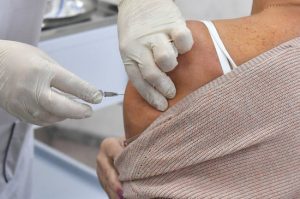
The Cabinet of Ministers intends to sign several additional agreements between the government, the Ukrainian Social Investment Fund (USIF) and the German state bank KfW on the development of social infrastructure in the country for the amount of EUR 36.5 million.
The relevant draft documents were adopted at a government meeting on Wednesday.
In particular, a draft supplementary agreement to the agreement dated April 19, 2018 signed with KfW for UAH 9 million was approved for the Promotion of Social Infrastructure Development Project; a draft supplementary agreement to the agreement dated May 20, 2019 signed with KfW for the amount of EUR 14.45 million for the Promotion of Social Infrastructure Development. Improvement of Rural Basic Health Project; a draft agreement with KfW for the amount of UAH 13.1 million for the Promotion of Social Infrastructure Development Project.
Deputy Prime Minister, Minister for Reintegration of Temporarily Occupied Territories of Ukraine Oleksiy Reznikov was authorized to sign the documents.

Ukraine is preparing for the introduction of vaccination passports against COVID-19, said chief sanitary doctor of Ukraine Viktor Liashko in an interview with Ukraine 24 on the Telegram channel of the TV channel on Tuesday.
According to him, all vaccinated will be entered into the electronic health care system so far.
“When mandatory vaccination passports are introduced at the international level, Ukrainian doctors will be able to promptly issue a certificate of vaccinations,” Liashko stressed.
Also, according to the chief sanitary doctor, the government is doing everything possible to vaccinate the population of Ukraine over 18 free of charge with two doses of the vaccine.

Ukraine in 2020 reduced the export of electricity by 26.5% (by 1.715 billion kWh) compared to 2019, to 4.754 billion kWh, according to the data of NPC Ukrenergo.
According to the calculations of Interfax-Ukraine, the supply of electricity from the Burshtyn TPP energy island to Hungary, Slovakia and Romania decreased 32.1% (by 1.428 billion kWh), to 3.02 billion kWh.
Electricity supplies to Poland grew by 7.8% (by 107.3 million kWh), to 1.484 billion kWh. Electricity supplies to Moldova decreased 74.1% (by 476.9 million kWh), to 167.1 million kWh. Export to Belarus amounted to 82.8 million kWh.
Ukrainian electricity was not exported to Russia.
At the same time, Ukraine in 2020 also cut electricity imports by 15.3% (by 413.7 million kWh) compared to 2019, to 2.285 billion kWh, including 1.474 billion kWh supplied from Slovakia, 516 million kWh from Hungary, 152.3 million kWh from Belarus, 89.4 million kWh from Romania, and 53.4 million kWh from the Russian Federation.
In addition, within technological flows associated with the parallel operation of the IPS of Ukraine with the power systems of neighboring countries and power supply of dead-end areas, 58.9 million kWh of electricity was imported from the Russian Federation last year, and 0.9 million kWh from Belarus. Emergency supplies from Hungary amounted to 1.1 million kWh.

SOE Skhidny Mining in 2020 reduced the production of uranium oxide concentrate by 7.1% (or by 57.2 tonnes) compared to 2019, to 743.7 tonnes, according to the information from the unified public open data portal.
According to the enterprise, 93.6 tonnes of uranium concentrate were produced in January, 21.9 tonnes in February, 96 tonnes in March, 90 tonnes in April, 40 tonnes in May, 74.2 tonnes in June, and 86 tonnes in July, 77.3 tonnes in August, 58.4 tonnes in September, 7 tonnes in October, 92.5 tonnes in November, and 6.8 tonnes in December.
The deterioration of production indicators over the past two years was due to the periodic withdrawal of the company’s divisions to a forced downtime.
As reported, Skhidny Mining in 2019 reduced the production of uranium oxide concentrate by 32.1% (by 378.6 tonnes) compared to 2018, to 800.9 tonnes.
Skhidny Mining is the only uranium ore mining and processing enterprise in Ukraine and the largest in Europe.

The World Bank will provide Ukraine with about UAH 2.5 billion to purchase a vaccine against coronavirus (COVID-19) disease, Deputy Health Minister Svitlana Shatalova said at a press briefing in Kyiv on Thursday.
“Ukraine will receive funds for the purchase of vaccines against COVID-19. Such assistance is provided by the World Bank. About UAH 2.5 billion is planned to be allocated for the new Ukraine Emergency COVID-19 Response and Vaccination Project,” she said.
“Relevant negotiations are being held between the Board of Directors of the World Bank and the government of Ukraine since December 2020. As part of the preparation of the project, the implemented vaccination strategy will be taken into account,” Shatalova said.
Ukrainian population by regions as of Sept 30, 2020 (graphically).

SSC of Ukraine